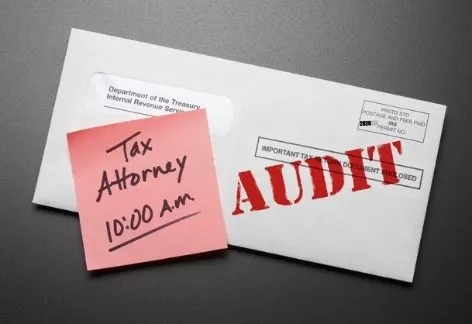If you receive an IRS notice, it can be extremely stressful. But what does it mean to be audited by the IRS? What are your options to resolve it?
An audit from the IRS is not necessarily routine, but it isn’t something to immediately fear, either. If you aren’t being audited by the IRS, then it might calm your nerves to know that the IRS audits fewer and fewer people with each passing year. There has been as much as a 23 percent decline over the last two decades in IRS audits, with as few as 0.45 percent of incoming individual returns seeing an audit in 2019, compared to a relatively staggering 5.6 percent in 1963.
While the IRS does promise that audits will begin to rise in the near future, and is gearing up by training more auditors, it’s still something that’s somewhat unlikely to happen to you. But the IRS audit process can happen. And not always for the reasons you might expect. Let’s take a look at why the IRS audits taxpayers, to begin with, and what it might look like to be audited by the government.
What Does It Mean to Be Audited by the IRS?
The Internal Revenue Service is in the business of ensuring that the tax gap remains minimized, utilizing both human auditors and computer programs to discover and investigate financial anomalies, usually those that occur between individual returns and information returns generated by banks and other financial institutions. In other words, if the information provided by a taxpayer on their tax return is not congruent with the information provided by banks and employers, then a system within the IRS throws up a red flag.
Sometimes, it’s just a simple math mistake. In many cases, the IRS will even sort it out for your and send you a bill afterward – or take the difference out of a tax credit you qualified for. If the differences become more serious if details go overlooked, if certain deductions don’t make any sense, or if the income in question is very, very large – usually over $1 million per year – the likelihood of an audit goes up considerably. It is at this point that the IRS takes one of two approaches.
Different Types of IRS Audits
Tax audits occur either in person or on paper. The former is either a field audit or an office audit, while the latter is a correspondence audit. Field audits are usually the more serious of the three.
Correspondence Audits
Correspondence audits usually involve simple misunderstandings or questions regarding certain anomalies, such as unusually high income for the given profession and location, or deductions that do not make sense. By providing simple financial proof to justify your home office deduction, for example, or explain why you earned much more this year than the last, you eliminate suspicion, and the IRS moves on.
Field Audits
A field audit might require a little more work. The IRS will visit you in person to ask questions regarding your income and tax returns. In cases where criminal tax fraud may be involved, the IRS may even audit you simply because you have a connection to someone else being investigated.
Office Audits
In an office audit, the IRS will ask you to come to them.
How Do You Know You Are Being Audited by the IRS?
Regardless of how you are being audited, you should always be notified via mail. The IRS does not initiate audits over the phone. This is to protect your data and privacy and prevent taxpayers from falling prey to phishing scams and other dubious activities. The IRS will request different documents depending on the exact nature of what triggered the audit. Examples of what the IRS might want to see include:
- Receipts for major purchases, especially business-related receipts;
- Bills of any sort;
- Canceled checks;
- Legal papers, including detailed service costs and receipts;
- Loan agreements;
- Travel tickets;
- Medical account statements, physician statements, contracts for medical care, and other financial records related to healthcare;
- Employment documents;
- And other related financial items.
Note that you are required to hold onto this type of information for at least three years after the tax return related to any given item was filed. This is also typically as far as the IRS is going to audit you in most cases (with specific exceptions, such as criminal activity).
Why Does the IRS Audit Taxpayers?
There are two major reasons why the IRS will audit a taxpayer’s account. These are:
- Because of a red flag that requires investigating. This could be anything from a simple math mistake to a sign of potential fraud.
- In connection with another investigation, especially if fraud or other crimes are involved.
There are a few red flags that may call the IRS onto your account more so than others. In no particular order, certain risk factors that increase the likelihood of an audit by the IRS include:
- Very, very high reported income, or very, very low reported income;
- Discrepancies that show unreported income;
- Large cash deposits;
- “Structuring” cash deposits, by making smaller, albeit frequent deposits;
- Signs of excessive spending compared to income;
- Too many itemized deductions (which you may not qualify for);
- Math mistakes;
- Claiming hobby expenses and revenue as business expenses (they probably aren’t);
- Foreign assets;
- And more.
Some believe that you can be audited by the IRS as part of a routine “audit lottery”. This may be based on chance and doesn’t really mean that anything in your account or return caused suspicion. Whether or not there is such a thing as an “audit lottery” remains up for debate. In 2011, commissioner of the IRS Doug Shulman declared the audit lottery as a myth. The statement made at the National Press Club explains that audits are based on “sophisticated risk models”, and that the IRS looks back on the data gathered through individual returns and information returns to find potential cases of fraud, or simple mistakes.
Do You Need Professional Help?
The majority of taxpayers will never be audited by the IRS, and most of those that will are likely to receive a piece of mail asking for a few documents, followed by a small bill. But if an audit into your finances and taxes becomes more than that, you may want to consider getting professional tax help – not only to work your way through the investigation and ensure that things go as quickly and smoothly as possible but to prepare your tax returns in the future and avoid the same mistakes and misunderstandings. Taxes don’t have to be complicated – especially if you get IRS audit help.

